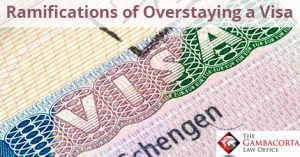Overstaying a U.S. Visa can result in some serious ramifications. The moment you overstay your time in the U.S. or you ignore the departure date on your I-94 or the expiry date on your visa, your visa automatically becomes void and you will not be able to apply for a new visa at the Consulate of your home country or any other Consulate.

In many instances, you might be barred from reentering the U.S. for a specific timeframe, depending on the length of time you stayed in the country and whether you qualify for an exception or if you actually accumulated unlawful presence.
Length of Time Overstayed
A set date when a visa recipient must leave the country is provided. This is the date shown on the Form I-94 Arrival/Departure Date. That’s a different date from the visa expiration date.
If you entered with student status, your I-94 will likely state, D/S for the duration of status.
This means that your overstaying starts the moment you stop studying or abiding by the stipulations of the visa. This is not the case with immigrant students in the U.S. unless they are deemed as unlawfully present by an immigration judge.
Bar Times for Accumulating Unlawful Presence
Currently, there are 3 levels of Penalties you can be subjected to for overstaying a U.S. Visa. Consequences may result in being banned for a specific time frame or maybe even permanently.
- If you stayed in the U.S. without authorization for more than 180 days but less than a year and you voluntarily leave without any executive decision against you, requesting your removal from the country, you will be not be allowed entry into the U.S. for a period of 3 years.
- Overstaying for over 365 days results in a 10-year ban from the country. After the 10 year ban, you may be able to apply for a waiver and could be granted re-entry into the United States of America.
- Accumulating unlawful presence of over a year can result in a permanent ban if you decide to re-enter the country without authorization. Consult with an expert immigration attorney to assist you if you are in this type of situation.
All immigrants must be aware that these ramifications may apply only if you leave the country or you have been forcibly removed and you return without inspection. In very few cases, people that qualify for green cards have avoided the time bars by simply adjusting status while living in the United States of America.
Adjusting status entails the preparation of supporting documentation and showing up for an interview and proving that the evidence you provide to immigration officers is substantial enough to gain approval.
Not everyone is eligible to adjust their status as not everyone is lawfully living in the U.S. Such people will require to apply for an adjustment of status from a U.S. Consulate in their home country. If an undocumented person applies while living in the U.S. the bar time may be applied and they could be deported.
However, if they are eligible for a waiver and are able to prove extreme hardship to a qualifying U.S. relative they may qualify. Immediate relatives of U.S. citizens can also apply for a provisional waiver and can qualify if they are not subjected to other grounds of inadmissibility and they can prove extreme hardship to a U.S. citizen parent or spouse.
Meet with a Knowledgeable Immigration Lawyer
If you have overstayed your U.S. Visa and are subjected under the executive order of deportation and do not want to leave the country, you will need a professional Immigration Attorney as soon as possible. Contact The Gambacorta Law Office today at 847-443-9303 for assistance and we will gladly guide you through the whole process.
Also Read :

